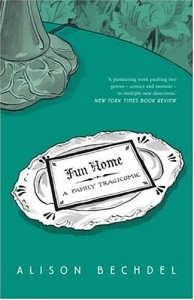 As incoming freshmen at Duke University wrapped up orientation week on Friday, campus newspaper The Chronicle checked up on the reaction to the choice of Alison Bechdel’s Fun Home as an all-class summer reading book. Although some freshman have opted not to read the book because they believe it would conflict with their values, it’s still evoking exactly what campus representatives everywhere hope to achieve with such communal reads: a passionate discussion about “big issues” like morals, sexuality, literary value, and living in a diverse society.
As incoming freshmen at Duke University wrapped up orientation week on Friday, campus newspaper The Chronicle checked up on the reaction to the choice of Alison Bechdel’s Fun Home as an all-class summer reading book. Although some freshman have opted not to read the book because they believe it would conflict with their values, it’s still evoking exactly what campus representatives everywhere hope to achieve with such communal reads: a passionate discussion about “big issues” like morals, sexuality, literary value, and living in a diverse society.
In fact, the discussion has been ongoing at least since late July, when incoming freshman Brian Grasso posted in a Facebook group for members of the class of 2019 that he would not be reading Fun Home “because of the graphic visual depictions of sexuality.” Grasso added that he feels “I would have to compromise my personal Christian moral beliefs to read it.”
According to The Chronicle, Grasso’s post touched off a lively debate (unfortunately not viewable to non-members of the private Facebook group). Several fellow incoming freshman posted in support of Fun Home, including Marivi Howell-Arza who said it could “allow you to open your mind to a new perspective and examine a way of life and thinking with which you are unfamiliar.”
Others agreed with Grasso, particularly in regards to the few images of nudity and sexual activity contained in the book. Student Jeffrey Wubbenhorst said in an email to The Chronicle that he might not object to a prose novel with the same content, but “the nature of Fun Home means that content that I might have consented to read in print now violates my conscience due to its pornographic nature.”
Grasso said that he voiced his opinion in the Facebook group because he “wanted to make sure students with similar Christian beliefs did not feel alone,” adding that he felt “it was like Duke didn’t know we existed, which surprises me.” In fact, members of the selection committee acknowledged when the book selection was announced in April that it was likely to be controversial with some students, parents, and alumni. History professor Simon Partner said in the press release on Duke’s website that the committee hoped Fun Home would “stimulate interesting and useful discussion about what it means, as a young adult, to take a position on a controversial topic.”
The summer reading announcement at Duke in Durham, North Carolina came one year after some South Carolina legislators proposed punitive budget cuts against the College of Charleston for selecting Fun Home as an all-campus read for Summer 2013. Ultimately that debate ended with an unsatisfactory “compromise” whereby the college’s funding was restored, but the funds earmarked for teaching about founding documents, including the Constitution.
More recently, a college sophomore and her parents in Yucaipa, California demanded that Fun Home and three other graphic novels be “eradicated from the system” after she had already completed the Crafton Hills College English class where they were assigned. College officials stood by the books and the school’s academic freedom policy, ultimately deciding not to require a disclaimer on future syllabi for the class.
Help support CBLDF’s important First Amendment work in 2015 by visiting the Rewards Zone, making a donation, or becoming a member of CBLDF!
Contributing Editor Maren Williams is a reference librarian who enjoys free speech and rescue dogs.